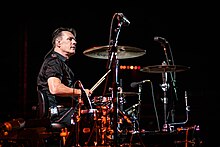
U2 are an Irish rock band formed in Dublin in 1976. The group comprises Bono, the Edge, Adam Clayton, and Larry Mullen Jr.. Initially rooted in post-punk, U2's musical style has evolved throughout their career, yet has maintained an anthemic quality built on Bono's expressive vocals and the Edge's chiming, effects-based guitar sounds. Bono's lyrics, often embellished with spiritual imagery, focus on personal and sociopolitical themes. Popular for their live performances, the group have staged several elaborate tours over their career.

David Howell Evans, better known as the Edge or simply Edge, is a British-Irish musician, singer, and songwriter. He is best known as the lead guitarist, keyboardist, and backing vocalist of the rock band U2. A member of the group since its inception, he has recorded 15 studio albums with them as well as one solo record. His understated style of guitar playing, a signature of U2's music, is distinguished by chiming timbres, use of rhythmic delay, drone notes, harmonics, and an extensive use of effects units.
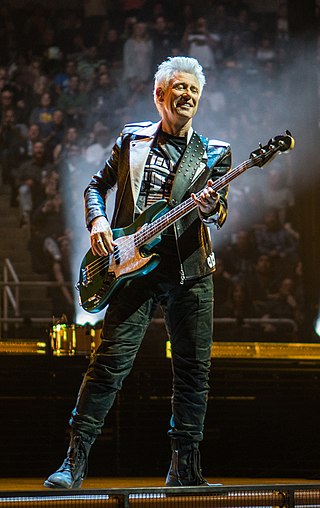
Adam Charles Clayton is an English-Irish musician who is the bass guitarist of the rock band U2. Born in Oxfordshire, England, he lived in County Dublin, Ireland after his family moved to Malahide in 1965, when he was five years old. Clayton attended Mount Temple Comprehensive School, where he met schoolmates with whom he co-founded U2 in 1976. A member of the band since its inception, he has recorded 15 studio albums with U2.
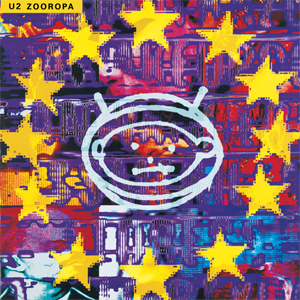
Zooropa is the eighth studio album by Irish rock band U2. Produced by Flood, Brian Eno, and the Edge, it was released on 5 July 1993 on Island Records. Inspired by the band's experiences on the Zoo TV Tour, Zooropa expanded on many of the tour's themes of technology and media oversaturation. The record was a continuation of the group's experimentation with alternative rock, electronic dance music, and electronic sound effects that began with their previous album, Achtung Baby, in 1991.

October is the second studio album by Irish rock band U2. It was released on 12 October 1981 by Island Records, and was produced by Steve Lillywhite. The album was lyrically inspired by the memberships of Bono, the Edge, and Larry Mullen Jr. in a Christian group called the Shalom Fellowship, and consequently it contains spiritual and religious themes. Their involvement with Shalom Fellowship led them to question the relationship between the Christian faith and the "rock and roll" lifestyle, and threatened to break up the band.
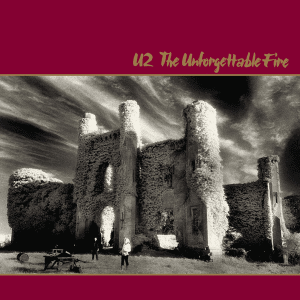
The Unforgettable Fire is the fourth studio album by Irish rock band U2. It was produced by Brian Eno and Daniel Lanois, and released on 1 October 1984 by Island Records. The band wanted to pursue a new musical direction following the harder-hitting rock of their previous album, War (1983). As a result, they employed Eno and Lanois to produce and assist in their experimentation with a more ambient sound. The resulting change in direction was at the time the band's most dramatic. The album's title is a reference to "The Unforgettable Fire", an art exhibit about the atomic bombing of Hiroshima.

Three, also known as U2 3, is the debut release by Irish rock band U2. It was released in Ireland on 26 September 1979 through the CBS Ireland record label.
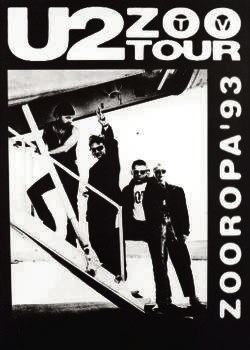
The Zoo TV Tour was a worldwide concert tour by rock band U2. Staged primarily to support their 1991 album Achtung Baby along with their subsequent 1993 album Zooropa, the tour visited arenas and stadiums from 1992 to 1993. Intended to mirror the group's new musical direction on Achtung Baby, the Zoo TV Tour departed from the band's previously austere stage setups by providing an elaborately staged multimedia spectacle, satirising television and media oversaturation by attempting to instill "sensory overload" in its audience. To escape their reputation for being earnest and over-serious, U2 embraced a more lighthearted and self-deprecating image on tour. Zoo TV and Achtung Baby were central to the group's 1990s reinvention.

"I Will Follow" is a song by rock band U2. It is the opening track from their debut album, Boy, and it was released as the album's second single in October 1980. Lead singer Bono wrote the lyrics to "I Will Follow" in tribute to his mother, who died when he was 14 years old.

"With or Without You" is a song by Irish rock band U2. It is the third track on their fifth studio album, The Joshua Tree (1987), and was released as the album's lead single on 16 March 1987. The song was the group's most successful single at the time, becoming their first number-one hit in both the United States and Canada by topping the Billboard Hot 100 for three weeks and the RPM national singles chart for one week, with a further three weeks at number two.

"Numb" is a song by Irish rock band U2. It is the third track from their eighth album, Zooropa (1993), and was released in June 1993 by Island Records and PolyGram as the album's first single. The song features a monotonous mantra of "don't" commands spoken by guitarist the Edge amidst a backdrop of various sound effects and samples. The noisy composition and lyrical concept for "Numb" were inspired by the theme of sensory overload, which had prominently been incorporated into the Zoo TV Tour. Lead singer Bono and drummer Larry Mullen Jr. provided backing vocals on the track.
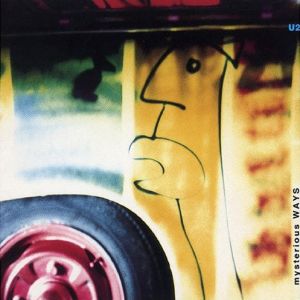
"Mysterious Ways" is a song by Irish rock band U2. It is the eighth track from their 1991 album, Achtung Baby, and was released as the album's second single on 2 December 1991, two weeks after the album. The song began as an improvisation called "Sick Puppy", with the band liking only the bass part that bassist Adam Clayton composed. The band struggled to build a song from it, with vocalist Bono and producer Daniel Lanois arguing intensely during one songwriting session. The song's breakthrough came after guitarist the Edge began experimenting with the Korg A3 effects unit. "Mysterious Ways" features a danceable beat, funky guitar hook, and conga-laden percussion, as well as mystical lyrics by Bono about romance and women.

"The Fly" is a song by Irish rock band U2. It is the seventh track from their 1991 album, Achtung Baby, and it was released as the album's first single on 21 October 1991 by Island Records. "The Fly" introduced a more abrasive-sounding U2, as the song featured danceable hip-hop beats, industrial textures, distorted vocals, and an elaborate guitar solo. Lead vocalist Bono described the song as "the sound of four men chopping down The Joshua Tree", due to its departure from the sound that had traditionally characterised the band in the 1980s.

"Desire" is a song by Irish rock band U2 and the third track on their 1988 album, Rattle and Hum. It was released as the album's lead single on 19 September 1988, and became the band's first number-one single in the United Kingdom and Australia. It reached number three on the Billboard Hot 100 in the United States, and topped both the Modern Rock Tracks and Mainstream Rock Tracks charts, making it the first song to reach number one on both charts simultaneously. It reached number two on the Dutch Top 40. At the 31st Annual Grammy Awards, "Desire" won the 1989 Grammy Award for Best Rock Performance by a Duo or Group with Vocal.
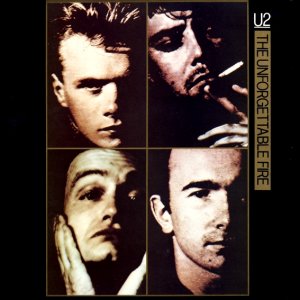
"The Unforgettable Fire" is a song by Irish rock band U2. It is the title track of their fourth album (1984), and was released as the album's second single in April 1985. The band cited an art exhibition by victims of the atomic bombings of Hiroshima and Nagasaki that was held at The Peace Museum in Chicago as the lyrical inspiration for the song. It became U2's first number one single in Ireland, their third top-ten hit in the United Kingdom, reaching number six on the UK Singles Chart, and reached number eight on the Dutch singles chart.
"Bullet the Blue Sky" is a song by Irish rock band U2, and is the fourth track from their 1987 album The Joshua Tree. Lyrically, the song was inspired by a trip that lead vocalist Bono made to Nicaragua and El Salvador, where he saw firsthand how local peasants were affected by United States military intervention in the region. Angered by what he witnessed, Bono asked guitarist the Edge to "put El Salvador through an amplifier." "Bullet the Blue Sky" is one of the band's most overtly political songs, with live performances often being heavily critical of political conflicts and violence.
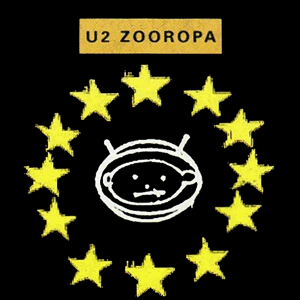
"Zooropa" is a song by Irish rock band U2, and is the opening track from their 1993 album of the same name. The song was the result of combining two pieces of music, the first of which was conceived in the studio, and the second of which was a soundcheck recording from one of the group's concert tours that was discovered by guitarist the Edge. The lyrics were written by lead vocalist Bono and describe two characters in a brightly lit city in a futuristic version of European society. Some lyrics in the song were taken directly from advertising slogans, and they also featured the phrase "dream out loud", which has appeared in other U2 media. The song touched on several themes, including moral confusion and the future of European society.

"Sunday Bloody Sunday" is a song by Irish rock band U2. It is the opening track from their 1983 album War and was released as the album's third single on 21 March 1983 in the Netherlands and West Germany. "Sunday Bloody Sunday" is noted for its militaristic drumbeat, harsh guitar, and melodic harmonies. One of U2's most overtly political songs, its lyrics describe the horror felt by an observer of the Troubles in Northern Ireland, mainly focusing on the 1972 Bloody Sunday incident in Derry where British troops shot and killed unarmed civil rights protesters. Along with "New Year's Day", the song helped U2 reach a wider listening audience. It was generally well received by critics on the album's release.
This is a timeline of the history of rock band U2:

U2 by U2 is an autobiography written by the members of Irish rock band U2, first published in 2006, edited by Neil McCormick. It portrays the story of U2 in their own words and pictures.

